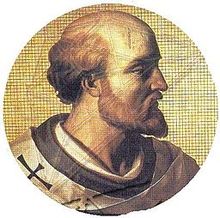Pope Sylvester II
|
Pope Sylvester II |
|
|---|---|
 |
|
| Papacy began | 2 April 999 |
| Papacy ended | 12 May 1003 |
| Predecessor | Gregory V |
| Successor | John XVII |
| Personal details | |
| Birth name | Gerbertus (Gerbert) |
| Born | c. 946 Belliac, Auvergne, Kingdom of France |
| Died | 12 May 1003 Rome, Papal States, Holy Roman Empire |
Pope Sylvester II or Silvester II (c. 946 – 12 May 1003) was Pope from 2 April 999 to his death in 1003. Originally known as Gerbert of Aurillac (Latin: Gerbertus Aureliacensis or de Aurillac; French: Gerbert d'Aurillac), he was a prolific scholar and teacher. He endorsed and promoted study of Arab and Greco-Roman arithmetic, mathematics, and astronomy, reintroducing to Europe the abacus and armillary sphere, which had been lost to Latin (though not Byzantine) Europe since the end of the Greco-Roman era. He is said to be the first to introduce in Europe the decimal numeral system using Arabic numerals. He was the first French Pope.
Gerbert was born about 946 in the town of Belliac, near the present-day commune of Saint-Simon, Cantal, France. Around 963, he entered the monastery of St. Gerald of Aurillac. In 967, Borrell II of Barcelona (947–992) visited the monastery, and the abbot asked the Count to take Gerbert with him so that the lad could study mathematics in Catalonia and acquire there some knowledge of Arabic learning. In the following years, Gerbert studied under the direction of Atto, Bishop of Vic, some 60 km north of Barcelona, and probably also at the nearby Monastery of Santa Maria de Ripoll. Neither place was under Islamic rule at the time.
Borrell II of Barcelona was facing major defeat from the Andalusian powers so he sent a delegation to Córdoba to request a truce. Bishop Atto was part of the delegation that met with Al-Hakam II of Cordoba, who received him with honor. Atto was mesmerized by the palaces in Cordoba and returned with great respect for the Arabs. Gerbert insisted that Atto teach him more about these Arabic princes who seemed to him more interested in the sciences and literature than warfare. Gerbert was fascinated by the stories of the Christian Bishops and judges who dressed and talked like the Arabs, well-versed in mathematics and natural sciences like the great teachers of the Islamic madrasahs. This sparked Gerbert's veneration for the Arabs and his passion for mathematics and astronomy.
...
Wikipedia
